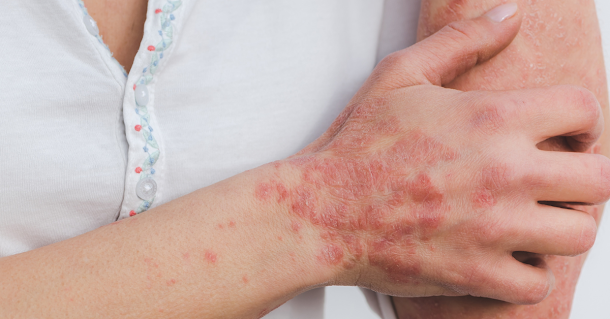The 5 Worst Foods Not to Eat If You Suffer from Psoriasis
If you suffer from psoriasis, it’s important to be aware of which foods can trigger flare-ups. In this blog post, we’ll discuss the five worst foods to eat if you are trying to manage this skin condition. From dairy products to fatty and processed foods, there are some foods that should be avoided if you want to keep psoriasis symptoms at bay. Read on to find out the worst foods to eat if you suffer from psoriasis.
1) Tomatoes
Tomatoes are one of the foods that can cause flare-ups for those with psoriasis. Tomatoes contain an acid called solanine, which has been linked to skin inflammation and irritation in some people. If you have psoriasis, it is best to avoid tomatoes as much as possible. This includes tomato sauce, salsa, ketchup, canned tomatoes, etc.
Eating cooked tomatoes may be a better option if you cannot completely cut them out of your diet. Cooking them can reduce their acidity and make them easier on your skin. If you do eat tomatoes, make sure to keep them to a minimum and pay close attention to how your skin reacts.
2) Processed Meats
Processed meats like bacon, sausage, hot dogs, and deli meats are some of the worst foods to eat if you suffer from psoriasis. These products are often full of unhealthy fats, sodium, and preservatives. These unhealthy ingredients can lead to inflammation in the body, which can exacerbate psoriasis symptoms. Processed meats can also contribute to poor gut health, which is linked to the development of psoriasis in some people. Therefore, it’s best to avoid processed meats if you want to manage your psoriasis symptoms.
3) Gluten
When it comes to foods that may trigger psoriasis, gluten is one of the most well-known culprits. Gluten is a protein found in wheat, rye, and barley and is often found in many processed foods. Eating foods containing gluten can cause an autoimmune response in those with psoriasis, leading to increased inflammation and flare-ups of symptoms.
If you suffer from psoriasis, it’s important to avoid or limit gluten in your diet. Try to stick with whole grains such as quinoa, brown rice, buckwheat, millet, and amaranth, all of which are naturally gluten-free. If you're not sure if a food contains gluten, read the label carefully to check for hidden sources of gluten. It's also a good idea to limit your intake of processed and packaged foods and opt for fresh, unprocessed ingredients whenever possible.
4) Dairy
Dairy products can be particularly problematic for people with psoriasis, and even those who don’t suffer from the condition should limit their dairy intake. Dairy contains hormones and proteins that can cause inflammation in the body, triggering psoriasis flare-ups and skin irritation. Studies have shown that dairy intake may also increase psoriasis symptoms such as scaling and redness. If you suffer from psoriasis, it is best to avoid milk, cream, cheese, butter, yogurt and ice cream. If you can’t avoid dairy altogether, try limiting your intake and opting for low-fat versions of the above products.
5) Nightshade Vegetables
Nightshade vegetables are a group of plant-based foods that includes tomatoes, potatoes, peppers, eggplant and goji berries. While these vegetables are popular in many dishes, they can be problematic for those with psoriasis. That’s because they contain high levels of alkaloids, which can cause inflammation and aggravate existing psoriasis symptoms.
For individuals with psoriasis, nightshade vegetables should be avoided or reduced in their diet. If nightshades are consumed, the serving size should be kept to a minimum. In some cases, it may be best to eliminate these vegetables together.
To replace nightshades in your meals, try using ingredients like cruciferous vegetables (like kale, cauliflower and broccoli), sweet potatoes, butternut squash, green beans and other non-starchy vegetables. These options can add flavor and texture to any dish without triggering a psoriasis flare-up.
If you do eat nightshade vegetables, it’s important to be aware of potential side effects. Some people may experience an increase in redness and itching after eating them. If this is the case, it’s best to stop eating nightshades and talk to a doctor about alternative diet options and getting Psoriasis treatment in Coimbatore is to be considered option.




Comments
Post a Comment